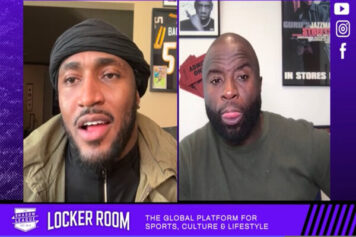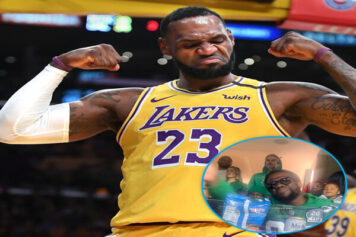Player empowerment has become a new term that media members such as myself like to use to describe The LeBron James era of NBA basketball, branding and business.
From his social justice stances to his criticisms of the NCAA to his partnership with Klutch Sports to the culturally-inspired content he puts out with Springhill ENT to his IPromise school initiative, Bron has made sure that players will no longer return to the days of Scottie Pippen.
However, at times, praising him suggests that players of the 70s, 80s and 90s were happily playing for peanuts before all of these superstars began calling their own shots in the NBA and using the financial stability gained in larger contracts and their brand popularity to strongarm once omnipotent owners into acquiescing to their financial or personal desires.
THE LAST DANCE PT 1 & 2
The first two parts of The Last Dance basically laid the groundwork for the Chicago Bulls’ final Championship run. It gave insight into the various relationships between players and owners and how star players were treated back then. Revealing how little some owners and GM’s valued the actual man, often treating players as no more than numbers on a spreadsheet.
Scottie Pippen only got $22.2M in his 11 seasons with the #Bulls.
He made up for it by getting $77M in the next 5 years with the Rockets & TrailBlazers.
He said his time would come and it did #TheLastDance pic.twitter.com/UnnBVZrEYz
— Etan Thomas (@etanthomas36) April 20, 2020
Viewers living this for the first time were shocked to find out that Scottie Pippen, who was considered a Top 5 player in the game during the Bulls’ first five championships, was getting paid like a lap dancer at a seedy strip spot in the backwoods of Iowa.
Here you have a guy that came to the Bulls when Michael Jordan couldn’t get it done alone and became the perfect Swiss army knife, doing all the dirty work so that MJ could illuminate his brilliance on the rest of the league.
For some reason, however, because Pippen was an unheralded draft pick out of Central Arkansas and played in the shadows of the NBA’s biggest money generator, as Chicago entered that final season, Pippen was the sixth highest-paid player on the Bulls and 122nd highest in the entire NBA.
Bulls players Ron Harper, Toni Kukoc, Dennis Rodman and role player Luc Longley, all made more than Pippen. Sure part of it was Pippen and his agent’s fault. Pippen admittingly signed a poorly-negotiated seven-year $18 million contract back in ‘91 because he wanted security and he feared that an injury could derail his paper.
In other words, he was taken advantage of.
SUPER WACK TO SUPER MAX
Remember, they didn’t have supermax contracts back then. In fact, it was in 2017 that Steph Curry agreed to a new five-year DVPE deal with the Warriors, worth $201 million, ushering in a new financial milestone for players.
Players were getting paid in the 90s, but they definitely weren’t getting their fair share of the pie as the NBA expanded globally and financially. Guys like Pippen helped to enhance the product and visibility of the league and got very little for it.
Then the way General Manager Jerry Krause treated Pippen added more disrespect to the cipher. Lying to him, stringing him along, hinting that Pippen would get taken care of as his contract became outdated and inferior players started eating off a market that was expanding and growing.
When Jerry insinuated that he might even trade Pippen, that was the last straw and the relationship between the two went south, with Pippen publicly berating Krause at every opportunity. Pippen also pulled what we know today as a “Kawhi Leonard” move.
PIPPEN CREATED THE KAWHI LEONARD MOVE
With no new contract in tow, Pippen waited until the season was about to start to get foot surgery. Following the surgery, Pippen was still without a new contract and Pippen, now 32, was scheduled to miss the first two months of the regular season and possibly three months. Pippen basically shut it down. It was a tactic he was using to try and force Chicago into giving him a new deal. He was leveraging his importance to the team against how badly owner Jerry Reinsdorf wanted to win another championship.
It worked for Leonard. He never played another game with the Spurs and got paid.
It didn’t work out for Pippen. He ended up playing in the final 44 games of the regular season and helping Chicago win a sixth championship. The relationship between Pippen and the front office deteriorated.
Pippen eventually got his bag, but in Houston with Charles Barkley. The Bulls broke up the entire dynasty and cleared house. They signed Scottie to a deal worth $67.2 million for five years – with an additional $15 million in incentives – before trading him. His salary jumped to $11 million in 1999 with the Rockets.
OLD SCHOOL RULED
Problem was, Reinsdorf, who also owned the Chicago White Sox, was old school. In the documentary, he said that once a player signs a contract he doesn’t renegotiate a damn thing.
That’s how the old school team owners did business. Often taking advantage of a player or agent’s inferior knowledge of how the books work. It has since changed for players of Pippen’s caliber. They are more informed. More aware and through well-negotiated collective bargaining agreements, have gained more control and a bigger piece of the financial pie.
Winning is too important to making money these days. Having star power is everything. If a star player gets his feelings hurt, he might just bounce. Players are always scheming and trying to create Super Duos and Super Teams and play with their boys. At the very least, they have learned that destination and comfortability is something that they can control.
AGE OF PLAYER EMPOWERMENT
What happened to Pippen would never happen in this age of player empowerment. The max deals would be on the table and a six-time NBA champion and Hall of Fame player wouldn’t have to resort to clowning his GM in public because he’s embarrassingly underpaid.
Pippen’s story is one that a lot of superstars encountered in the earlier days of the NBA as the league transformed into the billion-dollar global phenomenon that it is today. He was on the front lines of players getting screwed. If there was a Rich Paul around when Pippen was balling, he would have gotten his money on the first contract and not been bamboozled by his agent and a fear of returning to poverty.
MJ said Pippen was being selfish, but that mentality is outdated. Players understand the money game so much better now. From how TV revenue is split to how their brands are monetized. But criticizing Pippen was just MJ’s desire to win another championship. He knew he needed Pippen to do it.
https://twitter.com/pompeodotjpeg/status/1252178435595624448
The story of Scottie Pippen’s financial battles with the Bulls in The Last Dance gives a deeper understanding of how much superstars were getting paid and how little financial freedom or leverage most of the players had.



